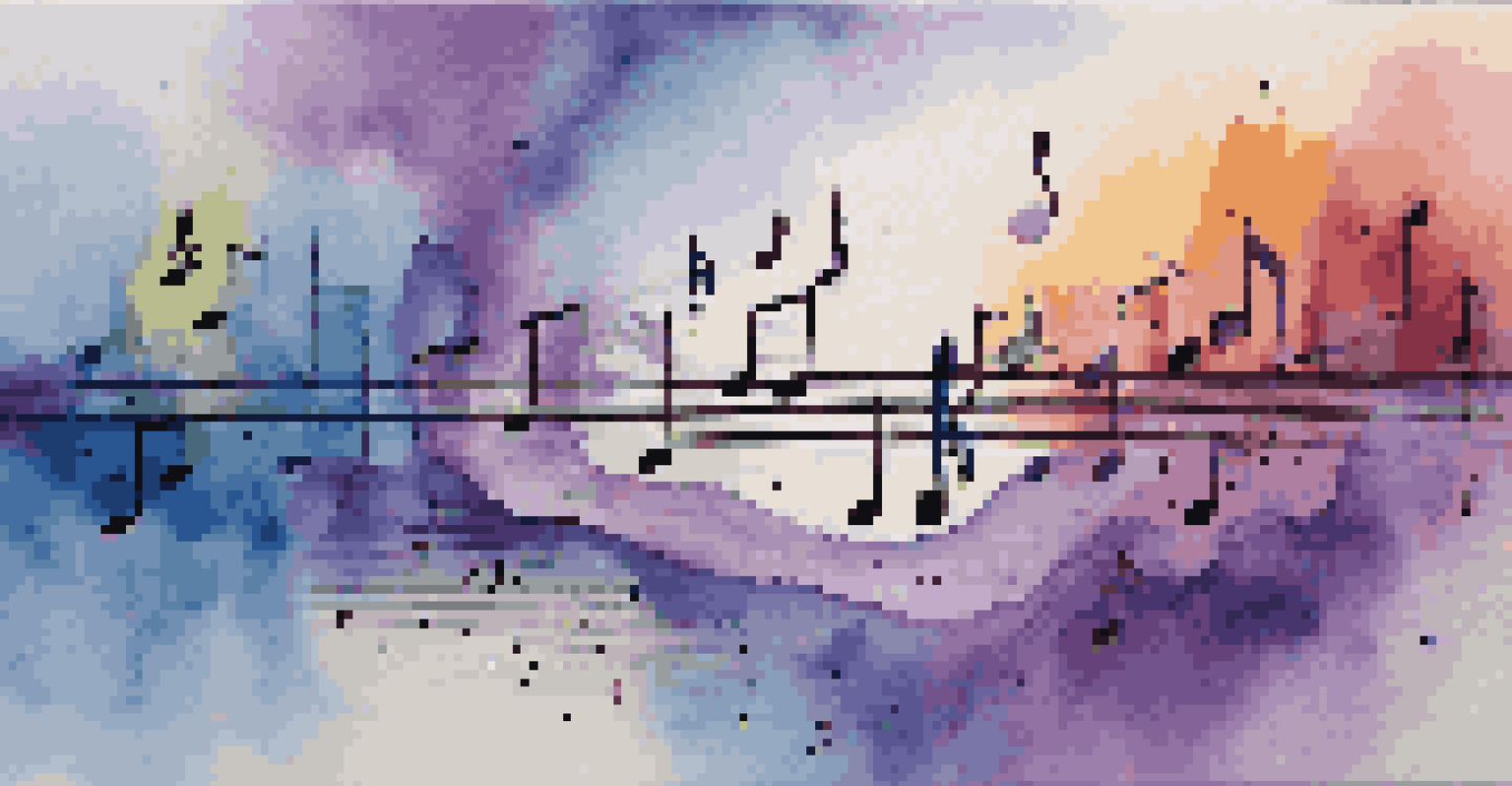The Impact of Music on Emotional Intelligence Development

Understanding Emotional Intelligence and Its Importance
Emotional intelligence (EI) refers to the ability to recognize, understand, and manage our own emotions while also recognizing and influencing the emotions of others. It's a vital skill in both personal and professional settings, allowing for better communication and stronger relationships. In today's fast-paced world, individuals with high emotional intelligence often excel in teamwork and leadership roles.
Music can change the world because it can change people.
Research indicates that EI can be developed over time, much like any other skill. This development is influenced by various factors, including social interactions, life experiences, and even artistic pursuits. Among these pursuits, music stands out as a powerful medium that can significantly enhance emotional understanding.
By delving into the world of music, individuals can tap into their emotions and those of others, fostering a deeper connection to their own emotional landscape. This connection not only aids in self-awareness but also enhances empathy, a key component of emotional intelligence.
Music as a Tool for Emotional Expression
Music has a unique ability to express complex emotions that words often fail to capture. Through melody and rhythm, individuals can channel their feelings, whether it's joy, sadness, or anger. This expression is crucial for emotional development, as it encourages individuals to explore and articulate their emotions more freely.

When people engage with music, whether by listening or creating, they often find a safe space to express their feelings. This process can lead to greater self-awareness, as the act of reflecting on music can prompt individuals to confront their emotional states. As they navigate these feelings, they strengthen their emotional intelligence.
Emotional Intelligence Defined
Emotional intelligence (EI) involves recognizing and managing our emotions while understanding those of others, enhancing relationships and communication.
For example, someone might listen to a heartfelt ballad during a tough time, allowing them to process their sadness. This acknowledgment of emotion can lead to personal growth and a better understanding of oneself, further enhancing EI.
The Role of Music in Building Empathy
Empathy, the ability to understand and share the feelings of others, is a cornerstone of emotional intelligence. Music fosters empathy by allowing listeners to experience the emotions conveyed by the artist. This connection can create a sense of shared experience, deepening our understanding of others’ feelings.
Where words fail, music speaks.
For instance, listening to songs that narrate personal struggles can help listeners relate to experiences outside their own. This exposure broadens perspectives and cultivates compassion, which are essential for effective emotional engagement in relationships.
Moreover, participating in group musical activities, such as choirs or bands, enhances empathy. Collaborative music-making requires individuals to tune into each other's emotions, creating a supportive environment that nurtures emotional connections.
Music and Its Impact on Mood Regulation
Music has a profound impact on our mood and can be intentionally used as a tool for emotional regulation. By selecting specific genres or songs, individuals can uplift their spirits or calm their minds, showcasing music's ability to influence emotional states. This skill is crucial for emotional intelligence, as it allows for proactive management of feelings.
Studies have shown that listening to upbeat music can increase feelings of happiness and motivation, while calming music can reduce anxiety and stress. Being aware of how different types of music affect mood equips individuals with the tools needed to navigate their emotional landscapes effectively.
Music Enhances Emotional Skills
Engaging with music helps individuals express emotions and build empathy, which are crucial components of emotional intelligence.
As individuals learn to use music for mood regulation, they become more adept at recognizing their emotional triggers and responses. This awareness is a key aspect of emotional intelligence, fostering personal growth and resilience.
Learning Emotional Cues through Music
One of the fascinating aspects of music is its ability to convey emotional cues through dynamics, tempo, and harmony. By actively engaging with music, individuals can learn to interpret these cues, enhancing their emotional awareness. This skill translates into everyday situations, helping individuals read the emotions of others more effectively.
For example, a piece of music that crescendos may evoke feelings of excitement, while a slower, softer melody may induce calmness or sadness. Recognizing these cues helps individuals develop a more nuanced understanding of emotional expression, both in music and in life.
As people become more attuned to emotional cues in music, they may find themselves better equipped to understand and respond to the emotional needs of those around them, further developing their emotional intelligence.
The Benefits of Collaborative Music Activities
Engaging in collaborative music activities, such as joining a band or participating in a community choir, offers a rich avenue for developing emotional intelligence. These experiences require teamwork, communication, and understanding, all of which are essential components of EI. By working together towards a common goal, individuals learn to navigate and express their emotions collectively.
Moreover, the shared experience of making music can foster strong bonds among participants, creating a supportive community where individuals feel safe to express their emotions. This environment nurtures both individual growth and group cohesion, enhancing emotional understanding.
Collaborative Music Fosters Growth
Participating in group musical activities nurtures teamwork and communication, essential for developing emotional intelligence.
For instance, a group of musicians must listen to each other and respond emotionally to create a harmonious sound. This active engagement cultivates empathy and emotional awareness, reinforcing the skills necessary for high emotional intelligence.
The Future of Music and Emotional Intelligence Development
As we continue to explore the relationship between music and emotional intelligence, the potential for integrating music into emotional learning programs becomes increasingly evident. Schools and organizations are beginning to recognize the value of music in fostering emotional skills, suggesting a promising future for EI development.
Incorporating music into curricula can provide students with valuable tools for self-expression and emotional regulation. This approach not only enhances academic engagement but also promotes overall well-being, preparing individuals to navigate the complexities of their emotions effectively.

Looking ahead, the synergy between music and emotional intelligence could lead to innovative therapeutic practices, enriching personal development and mental health initiatives. By embracing this connection, we can cultivate a society that values emotional understanding and resilience.